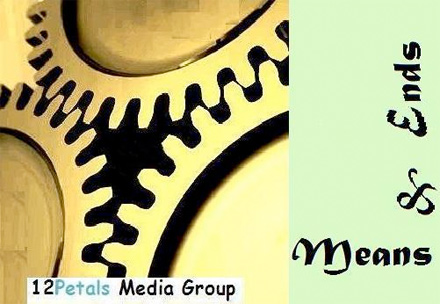به زبان فارسی
PICTORY
LATEST MUSIC
SEARCH
The principle of “Process”
by 12 Petals
28-Aug-2011
The dialogue of “Means” (specific actions), “Ends” (end goals), and “Process” carries a historical, ethical, social, and political importance. And, the Machiavellian philosophy of “the ends justify the means” has nowadays become the dominant decision-making axiom and spoken communication. Furthermore, in today’s accepted wisdom, all activities are generally observed exclusively in terms of their end results.
A narrow perception from “the ends justify the means” expression will lead one to believe that the aim is to attain the set goals by any means. If so, then unethical or untruthful conducts completely disregard the integration of means and ends. This partitioning standpoint between means and ends is not only considered deeply flawed, it can also consent to dishonesty and/or taking dangerous measures for reaching desired outcomes.
Dishonest means for an outcome can’t be justified. Dishonest means cannot be accepted despite the fact that it may serve and produce a creditable end. It could be very well asserted that the use of any dishonest means will certainly distort and damage the desired end goal as well.
From the culture of human rights perspective and living in an increasingly interdependent world, the process should be highly valued (“means” can be “ends”, and “ends” can be “means” to develop outcomes). The culture of human rights calls attention to the well-inbuilt and expected linking of means and ends. Moreover, the significance of genuine process is recognized as the most central connecting building block between the means and ends. This integration and also the preference of selecting genuine means to achieve a goal are noteworthy. Such preference can certainly assure for an eventual genuine outcome.
Per and for the continual furtherance of the human rights objectives, thus the “ends justify the means” axiom taken plainly should be discarded. In its place, the culture of Human Rights perspective of placing value on the principle of genuine “process” can be treasured.
Quote By Niccolo Machiavelli: "The ends justify the means”
Source: //www.Facebook.com/12Petals
فرهنگ حقوق بشر اصل روند را محترم میشمارد
بحث "وسیله"(اقدامات ویژه)، "هدف" (نتایج نهائی) و "روند" دارای اهمیت تاریخی، اخلاقی، اجتماعی و سیاسی میباشد وفلسفه ماکیاولی هدف وسیله را توجیه مینماید، امروزه اصل تصمیم گیری و ارتباطات گفتاری شده است.علاوه براین در خرد پذیرفته شده امروز، تمامی فعالیتها عموما بر اساس صرفا نتایج نهائی آنها مشاهد میگردند
درک ظریفی از هدف وسیله را توجیه مینماید، منجر به این باور میشود که هدف رسیدن به اهداف تعیین شده به هر وسیله میباشد. در این صورت پس رفتارغیر اخلاقی و غیر صادقانه یکپارچگی وسائل و هدف را کاملا نادیده میگیرد. این نکته نظر جداسازی بین وسیله و هدف نه تنها عمیقا دارای خدشه قلمداد میگردد بلکه میتواند بهرضایت در نادرستی و یا اتخاذ تدابیر خطرناک برای رسیدن به نتیجه مطلوب گردد.
ابزارغیر صادقانه را نمیتوان برای رسیدن به مقصود توجیه نمود. ابزارغیر صادقانه علیرغم این واقعیت که میتواند در رسیدن به هدفی معتبر کمک نماید، قابل قبول نمیباشد. میتوان اظهار داشت که استفاده از ابزار غیر صادقانه مسلما هدف نهائی مطلوب را تحریف و به آن آسیب میرساند.
از دیدگاه فرهنگ حقوق بشر و زندگی در دنیائی به طور فزاینده وابسته میگردد، روند باید ارزشمند تلقی گردد ( ابزار میتواند اهداف باشند و اهداف ابزاری باشند برای رسیدن به نتایج) فرهنگ حقوق بشر خواهان توجه به ساختار خوب و ارتباط مورد انتظار بین ابزار و اهداف میباشد. علاوه بر این، ویژگی روند واقعی به عنوان اصلیترین حلقه اتصال بین ابزار و هدف شناخته شده است. این انسجام و نیز رجحان انتخاب ابزار واقعی برای رسیدن به هدف قابل توجه میباشد. مطمئنا چنین رجحانی می تواند متضمن نتیجه واقعی نهائی گردد.
برای پیشبرد مستمر اهداف حقوق بشر، اصل "هدف وسیله را توجیه مینماید" را باید بسادگی کنار نهاد و به جای آن دیدگاه فرهنگ حقوق بشر را با ارزش نهادن به اصل واقعی "روند" را قرار داد.
نقل قول از نیکولو ماکیاولی "هدف وسیله را توجیه مینماید"
| Recently by 12 Petals | Comments | Date |
|---|---|---|
| “Secular Humanism” | 6 | Aug 22, 2012 |
| UN Declaration on the Right and Responsibility | - | Jun 24, 2012 |
Equal Dignity -- برابرى درمنزلت | - | Jun 20, 2012 |
RECENT COMMENTS
IRANIANS OF THE DAY
| Person | About | Day |
|---|---|---|
| نسرین ستوده: زندانی روز | Dec 04 | |
| Saeed Malekpour: Prisoner of the day | Lawyer says death sentence suspended | Dec 03 |
| Majid Tavakoli: Prisoner of the day | Iterview with mother | Dec 02 |
| احسان نراقی: جامعه شناس و نویسنده ۱۳۰۵-۱۳۹۱ | Dec 02 | |
| Nasrin Sotoudeh: Prisoner of the day | 46 days on hunger strike | Dec 01 |
| Nasrin Sotoudeh: Graffiti | In Barcelona | Nov 30 |
| گوهر عشقی: مادر ستار بهشتی | Nov 30 | |
| Abdollah Momeni: Prisoner of the day | Activist denied leave and family visits for 1.5 years | Nov 30 |
| محمد کلالی: یکی از حمله کنندگان به سفارت ایران در برلین | Nov 29 | |
| Habibollah Golparipour: Prisoner of the day | Kurdish Activist on Death Row | Nov 28 |



